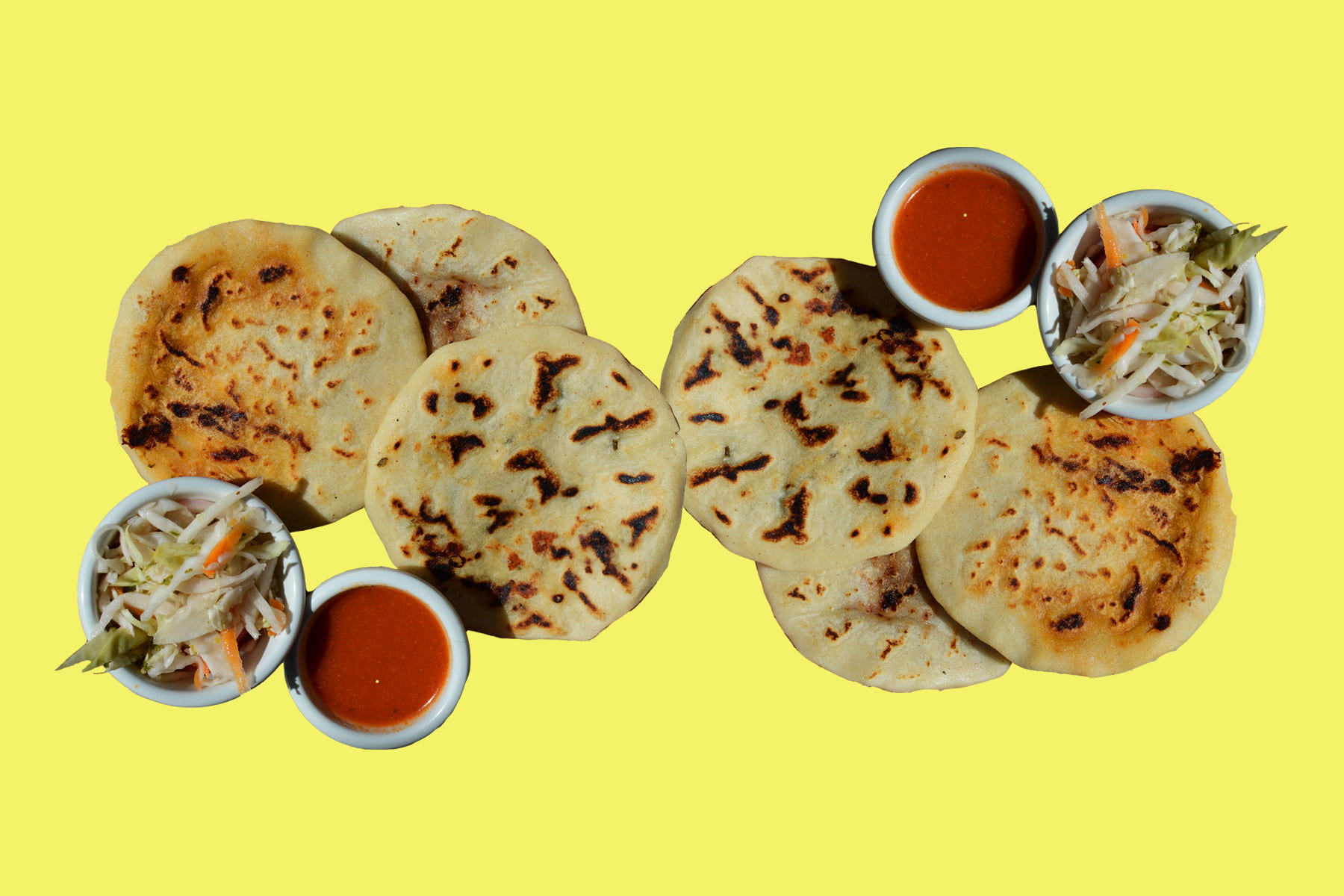Salvadoran Pupusas
Preparing the dough
There are different brands of tortilla flour to make the dough. MASECA, which can be found in most large supermarkets in the international section, is one of them but there are others. Follow the instructions on the bag and make as much dough as needed. Once the dough has been prepared set it aside while you prepare the filling.
Three Fillings
CHEESE
3 cups of shredded cheese (use hard and cream cheese mixed together; you can mix frying cheese, mozzarella and ricotta)
3 or 4 tablespoons of heavy cream
1/2 to 1 cup of ground “oroco” (this will be hard to find in the U.S. So you can use very finely chopped green peppers or scallions instead)
Salt to taste
Make a paste with these ingredients. To avoid the paste leaking, it should not be too soft.
“CHICHARRON”
1 cup cooked bacon (cooked with garlic, see below).
4 – 5 tomatoes
Salt to taste.
Cook bacon with some garlic (optional). Set fat aside but do not discard. Once cooked, grind bacon with the tomatoes, 1 green pepper, and salt to taste. Mix with some of the bacon fat until it has a soft consistency
MIXTAS
Ground and fried beans (they can be canned or prepared from your favorite recipe).
When filling the pupusas add beans, chicharron and cheese (or combine two of the three).
Making the pupusas
With two tablespoons of dough make a ball using your hands and later clap your hands until you make a round, thin (1/8 of an inch thick) tortilla. Continue making more tortillas this way. Put filling over one tortilla, cover with another and push down the sides to close them. This is the “beginners” method.
People who have experience do it this way: make a ball with the dough. Insert your thumb in the ball and make a hole in the center. Fill that hole with the filling, close the hole by pushing the dough on the sides up. Clap your hands carefully so that the filling doesn’t come out and flatten the ball.
Cook on a slightly greased griddle, pan or electric pancake griddler and cook over low-medium heat (325-350 F) first one side, then the other until they are cooked. Each side will be ready when it no longer sticks to the pan (depending on the thickness of the tortillas, this might take 4 minutes or more per side).
Pupusas are topped with pickled cabbage and tomato sauce.
PICKLED CABBAGE
Chopped cabbage that has been quickly passed through boiling water
Medium onion, sliced
Carrot, finely shredded
Cooked green beans, not too soft (optional)
Beets (optional)
Horseradish (optional).
Red pepper, finely chopped (optional)
Vinegar
Water
1 teaspoon oregano
Salt to taste
In a glass or plastic jar with wide opening mix all the ingredients. Add vinegar and water to taste. Mix with a wooden spoon (never metal). Put the mix in the refrigerator and let it rest for a week so that the ingredients pickle.
TOMATO SAUCE
Large tomatoes, peeled (the number will depend on how much sauce you want to prepare)
1 green pepper.
1 medium onion.
2 garlic cloves.
1 chicken flavored bouillon cube.
Cilantro (optional).
Water.
Salt to taste.
Cook all the ingredients with a little water. Put everything in a blender and blend. Cook for another 10 minutes, stirring occasionally
Spring/Summer 2001
Graciela Fortin-Magana, DRCLAS Graduate Student Associate from El Salvador contributed this pupusa recipe. Her mother sent her the recipe for the traditional Salvadoran dish by e-mail: a combination of a cookbook recipe and one for beginning cooks she found on the Internet. Fortin-Magana is a doctoral candidate at the Harvard Graduate School of Design and is working on an urban anthropological study of developer-built, low-income housing settlements in San Salvador.
Related Articles
Audacious Reforms
For many Latin Americans, the hopes raised by political democracy over the past two decades have been dashed by the realities of persistent poverty and growing social inequality, and by the…
Caipirinha
1 lime, quartered, 1-2 tablespoons sugar, 2 ounces of cachaca (the fiery Brazilian brandy), Ice cubes…
Cachupa
Isabel Ferreira, known around the Harvard community as the language instructor who teaches Portuguese for Spanish speakers, is used to crossroads. Born in Portugal, she moved to…





